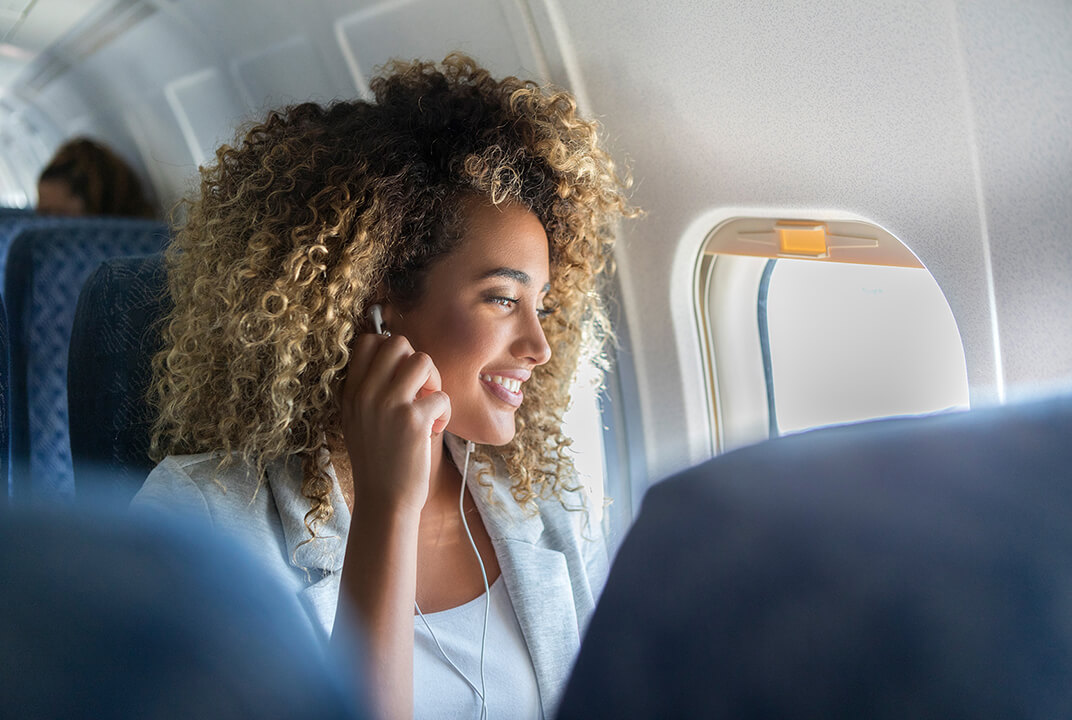Insight | Making lasting connections
Select Language
Making lasting connections
null
From creating long-term loyalty to instigating mid-air matchmaking, Inmarsat’s annual Inflight Connectivity Survey makes for surprising reading
What a difference a year makes. The last 12 months has seen new airlines launch and the aviation industry’s digital transformation continue apace. And nowhere is this truer than in the area of inflight connectivity, as new initiatives such as the European Aviation Network and the Iris programme move closer to completion.
It’s also been 12 months since Inmarsat’s last global Inflight Connectivity Survey revealed some key industry insights. Now back for its fourth year, the 2018 survey – the largest poll of passenger attitudes towards IFC in the world – saw Inmarsat speak to more than 9,300 passengers from 32 countries across Europe, the Middle East, Asia Pacific, and North and Latin America. And when it comes to connectivity the response is unequivocal: more than three quarters of respondents (78%) believe Wi-Fi is fundamental to daily life. Of those who believe inflight Wi-Fi is fundamental to daily life, 66% say it is an absolute necessity – up from 60% last year. Among high value passengers, attitudes are even more hardened – 78% in premium economy, 81% in business class and 91% in first class all deem inflight Wi-Fi a must-have.
Download the report
- Size
- 3 MB
The message is clear: inflight connectivity is no longer perceived as something that’s an added bonus on a flight – it’s now essential. The figures back this up: 65% of passengers that have had access to inflight Wi-Fi in the last year used it and 70% of passengers would be likely to recommend inflight Wi-Fi having tried it previously. Predictably, digital natives – millennials – recognise the value of staying connected, as 91% of 18-30 year olds would use inflight Wi-Fi if it was available on their next flight.
Quality connectivity is key when choosing an airline
The demand for inflight connectivity is such that passengers would choose it over other aspects of the airline experience. Last year, 54% of respondents said they’d prioritise staying connected over an inflight meal. This year, 53% said they’d even swap their inflight alcoholic drink for access to good Wi-Fi.
For airlines, this demand for connectivity presents a compelling opportunity to enhance customer loyalty and experience. Overall, 67% of passengers were more likely to rebook with an airline if high quality Wi-Fi was available. For those travelling with children, this figure rises to 81%.
The key here is quality. Passengers are no longer willing to compromise on the level of the service provided. In fact, 54% of those surveyed said that they’d rather not have inflight Wi-Fi at all if the service on offer was poor. And although 65% of passengers that had access to inflight Wi-Fi in the past year chose to use it, demand for quality inflight Wi-Fi services is significantly outstripping supply – less than half of passengers globally (45%) travelled on flights where the service was offered.
Connect to loyalty
Such is the increasing importance of IFC that it now comes fourth in terms of the most essential aspect when choosing an airline – behind the airline’s reputation, free checked baggage and extra legroom. In short, a reliable service providing high-bandwidth, high-speed connectivity is vital.
Here the experience in America is instructive. US airlines might have been the early adopters of IFC, but to date passengers have had a mixed experience with the standard of service offered. As such, only 42% of passengers in North America stated that inflight Wi-Fi would make them more likely to rebook with an airline. This reinforces the need for airlines to provide a premium offering that genuinely improves the customer experience.
There’s a clear business case for airlines to do so. The first chapter of Inmarsat’s Sky High Economics report, created in collaboration with the London School of Economics, found that by 2035 airlines will be able to realise $15.9bn in incremental revenues thanks to broadband-enabled planes. Using the latest IATA passenger traffic data and growth forecasts, including an expected near doubling of passenger numbers to 7.2 billion annually, the study also found that broadband-enabled ancillary revenue will reach an estimated $30bn for airlines by 2035.
Love is in the air
And with more of us travelling by air than ever before, what are the chances of finding love in mid-air? Quite high, it would seem. Over one-third (34%) of respondents admitted to being attracted to another passenger on a flight. The rise of dating apps shows no sign of abating, so it’s unsurprising that 57% of flyers would use an online dating app during a flight to match with other passengers.
So whatever the motive, passenger attitudes towards IFC are straightforward. They want it – and it needs to be seamless and always-on.
As Inmarsat Aviation President Philip Balaam, says: “Wi-Fi is essential to daily life on the ground, and airline passengers see no reason why their time on a flight should be restricted or spent any differently.”
He concludes: “Whether it’s used for sending that important work email, entertaining the children or even connecting with fellow passengers, staying online is becoming a crucial part of the inflight experience for today’s airline passengers.”


